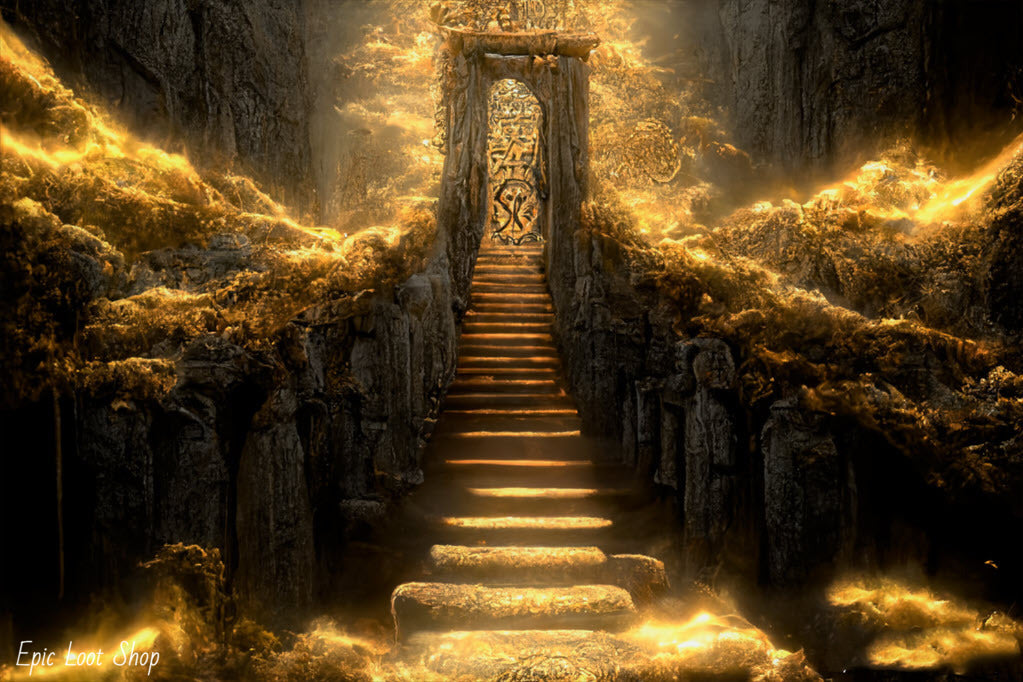Valhalla | Norse mythology
Valhalla was a majestic banquet hall in Asgard, the home of the gods. It was the dwelling place of Odin, the chief god and ruler of Asgard. Due to an effect that caused time to pass more slowly there than on earth, a single night in Valhalla could last one hundred earth years. This is where warriors slain in battle would feast under the leadership of Odin until Ragnarok, or end of days. The etymology of Valhalla is debated among scholars. Some sources claim it means “hall of the slain” or “hall of the fallen”, while others claim it means “hall of the chosen slain”.
What is the meaning of Valhalla?
Valhalla is a place of battle, where warriors go after they die in battle. It's also a place of feasting and enjoyment, where Vikings would eat, drink and tell stories of their exploits.
Valhalla means "hall of the slain" or "hall of the fallen." Valhalla is located in Asgard, one of the nine worlds in Norse mythology. The other worlds are Midgard (Earth), Alfheim (Elves), Svartalfheim (Dark Elves), Jotunheim (Giants), Niflheim (Misty World), Muspelheim (Land of Fire) and Helheim (Underworld).
Valhalla is ruled by Odin, who offers half his food and drink each day to his table for the einherjar. The einherjar live in Valhalla until Ragnarok comes and they fight against the forces of evil during this time.
After Ragnarok has been defeated, the einherjar will go back to Earth with Odin and continue fighting evil until Ragnarok comes again.
What is the Valhalla symbol?
The Valhalla symbol is a symbol used by Norse mythology to represent the afterlife. The symbol is also known as the "Valknut" and in English it is sometimes called the "knot of the slain."
The Valhalla symbol is made up of three triangles that surround a central point, which represents Odin's eye. The symbol can be found on many Viking artifacts including brooches, amulets, pendants and even on coins. The symbol represents Odin's sacrifice of his eye in order to drink from the Well of Wisdom at Mimir's Spring.
The symbol was also used to mark gravesites of warriors who died in battle so that they could be taken to Valhalla by Valkyries once they died.
The word "Valhalla" means "Hall of the Slain" in Old Norse and was one of Odin's halls where fallen warriors went after death.
What happens if a Viking doesnt go to Valhalla?
If a Viking doesn't die in battle, they will be doomed to live a long and unhappy life. They would grow old and wither away, and eventually die from old age.
But what if a Viking didn't go to Valhalla? Well, it would depend on the circumstances of their death. If they died of natural causes, then they would go to Helheim, which is basically like purgatory for Vikings. The souls there are trapped in an endless cycle of suffering until Ragnarok comes along to destroy it all and set them free. But if they were killed by another person, then their soul gets sent to Niflheim (the land of ice), where they are forced to labor for the rest of time until Ragnarok comes along again.
Now here's where things get interesting: if a Viking dies before they've earned enough glory fighting other men in battle (and women), then they'll be sent straight to Niflheim instead. You see, not only did you have to fight well enough on the battlefield during your life, but you also had to make sure that when you died your enemies knew who killed them so they could tell Odin about it!
What happens if a Viking dies without his sword?
The Vikings believed that the dead had to have their weapons with them in order to enter Valhalla. This is why they buried their weapons with them when they died, even if they didn't use it in battle.
The dead would be required to fight in the afterlife, and they needed their weapons to do so. The belief was that if a person died without his weapon, he would not be able to fight as well as he would have been able to if he had been armed.
Who are in charge of Valhalla?
Valhalla is a complex place. There are many different gods and goddesses, each with their own area of expertise. Thor, for example, owns the mead hall Valaskjalf and is in charge of warfare. Freyja owns Sessrumnir, where she lives with her husband Odur. Heimdallr owns Himinbjorg, which is home to his wife Sif and their nine-hundred children.
There are several different kinds of people who live in Valhalla:
The Einherjar (single-fighters) - These are brave warriors who have died in battle. They train every day in preparation for Ragnarok (the battle at the end of time).
The Valkyries - The Valkyries are fierce female warriors who ride into battle on horses and decide which warriors will be allowed into Valhalla by taking them there on horseback following their deaths in battle.
The Einherjar usually spend their time training for Ragnarok or feasting with the gods at Urd's Well (Urðarbrunnr), but they do not always do so with enthusiasm because they know that they will die before long when Odin sends them back into battle
Do females go to Valhalla?
Valhalla is a place for warriors, who are predominantly male, but there are also women who go to Valhalla.
Because it was a male-dominated religion, most people think of Valhalla as being a male place. But there are stories about women going there too!
There’s one story about a famous Valkyrie named Brynhildr (BRIN-hilt). She was so good at fighting that she got sent down from Asgard into Midgard (earth), where she became Queen Sigrun of Svithiod (Sweden). In this story, she was sent down because she was too good at fighting — she was better than any man could ever be!
Can you marry in Valhalla?
Valhalla is a place where people who died in battle go to live.
You can marry in Valhalla, but it's more like a war party than a wedding.
There are no bridesmaids, no groomsmen, no flowers, no rings and no cake.
The celebration takes place on the battlefield where the bride and groom met their death together.
The guests are all their friends from battle: Odin, Thor, Tyr and Freya (the goddess of love). They bring gifts of swords, shields and horses. The bride wears her armor and rides into battle with her groom at her side.
Conclusion
In sum, Valhalla seems to be a very accepting place that is welcoming to almost everyone, with the exception of dishonorable people who died in battle. It's a perfect place for warriors to reside, as it was meant for celebration, relaxation, and rejuvenation. If you're looking for an afterlife where your family reunites with you, you're likely going to have a great time in Valhalla—you really can't lose.




Dejar un comentario